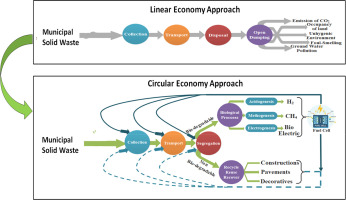当前位置:
X-MOL 学术
›
Sci. Total Environ.
›
论文详情
Our official English website, www.x-mol.net, welcomes your
feedback! (Note: you will need to create a separate account there.)
Biodegradable and non-biodegradable fraction of municipal solid waste for multifaceted applications through a closed loop integrated refinery platform: Paving a path towards circular economy.
Science of the Total Environment ( IF 8.2 ) Pub Date : 2020-03-28 , DOI: 10.1016/j.scitotenv.2020.138049 G Velvizhi 1 , S Shanthakumar 2 , Bhaskar Das 2 , A Pugazhendhi 3 , T Shanmuga Priya 2 , B Ashok 4 , K Nanthagopal 4 , R Vignesh 4 , C Karthick 4
Science of the Total Environment ( IF 8.2 ) Pub Date : 2020-03-28 , DOI: 10.1016/j.scitotenv.2020.138049 G Velvizhi 1 , S Shanthakumar 2 , Bhaskar Das 2 , A Pugazhendhi 3 , T Shanmuga Priya 2 , B Ashok 4 , K Nanthagopal 4 , R Vignesh 4 , C Karthick 4
Affiliation

|
An increase in population, rapid urbanization and industrialization has accelerated the rate of municipal solid waste generation. The current disposal of solid waste is a burgeoning issue and it's in immediate need to shift the existing disposal processes to a sustainable manner. Circular economy (CE) is a conceptual model which is been used for better use of resources and minimization of waste in a closed loop approach which could be appropriate for waste management. In this context, the present review illustrates the effective use of biodegradable and non-biodegradable fraction of solid waste in a closed loop integrated refinery platforms for the recovery of bioenergy resources and for the production of value added products. The biodegradable fraction of solid waste could be treated by advanced biological processes with the simultaneous production of bioenergy such as biohydrogen, biomethane, bioelectricity, etc., and other value added products like butanol, ethanol, methanol etc. The scheme illustrates the closed loop approach, the bioenergy generated from the biodegradable fraction of solid waste could be used for the operation of internal combustion engines and the energy could be further used for processing the waste. The non-biodegradable fraction of solid waste could be used for construction and pavement processes. Overall the study emphasizes the paradigm shift of solid waste management concepts from linear economy to a circular economy following the "Zero Waste" concept. The study also explains the circular economy policies practiced for solid waste management that stimulates the economy of the country and identify the pathways to maximize the local resources. In addition the review addresses the advanced information and communication technologies to unfold the issues and challenges faced in the solid waste management. The smart governance of managing waste using the "Internet of Things" (IoT) is one of the great precursors of technological development that could lead innovations in waste management.
中文翻译:

通过闭环集成炼油平台,可生物降解和不可生物降解的城市固体废物部分用于多方面应用:为循环经济铺平道路。
人口的增加、快速的城市化和工业化加速了城市固体废物的产生速度。当前固体废物的处置是一个新兴的问题,迫切需要将现有的处置过程转变为可持续的方式。循环经济 (CE) 是一种概念模型,可用于更好地利用资源并以闭环方法最大限度地减少废物,这可能适用于废物管理。在这种情况下,本综述说明了在闭环综合炼油平台中有效利用可生物降解和不可生物降解的固体废物部分,以回收生物能源和生产增值产品。固体废物的可生物降解部分可以通过先进的生物工艺处理,同时生产生物能源,如生物氢、生物甲烷、生物电等,以及其他增值产品,如丁醇、乙醇、甲醇等。该方案说明了闭环方法,从可生物降解的固体废物部分产生的生物能源可用于内燃机的运行,并且该能量可进一步用于处理废物。固体废物的不可生物降解部分可用于建筑和路面加工。总体而言,该研究强调了固体废物管理概念的范式转变,从线性经济到遵循“零废物”概念的循环经济。该研究还解释了为刺激该国经济并确定最大化当地资源的途径的固体废物管理实施的循环经济政策。此外,审查还讨论了先进的信息和通信技术,以揭示固体废物管理中面临的问题和挑战。使用“物联网”(IoT)管理废物的智能治理是技术发展的重要先驱之一,可以引领废物管理的创新。
更新日期:2020-03-28
中文翻译:

通过闭环集成炼油平台,可生物降解和不可生物降解的城市固体废物部分用于多方面应用:为循环经济铺平道路。
人口的增加、快速的城市化和工业化加速了城市固体废物的产生速度。当前固体废物的处置是一个新兴的问题,迫切需要将现有的处置过程转变为可持续的方式。循环经济 (CE) 是一种概念模型,可用于更好地利用资源并以闭环方法最大限度地减少废物,这可能适用于废物管理。在这种情况下,本综述说明了在闭环综合炼油平台中有效利用可生物降解和不可生物降解的固体废物部分,以回收生物能源和生产增值产品。固体废物的可生物降解部分可以通过先进的生物工艺处理,同时生产生物能源,如生物氢、生物甲烷、生物电等,以及其他增值产品,如丁醇、乙醇、甲醇等。该方案说明了闭环方法,从可生物降解的固体废物部分产生的生物能源可用于内燃机的运行,并且该能量可进一步用于处理废物。固体废物的不可生物降解部分可用于建筑和路面加工。总体而言,该研究强调了固体废物管理概念的范式转变,从线性经济到遵循“零废物”概念的循环经济。该研究还解释了为刺激该国经济并确定最大化当地资源的途径的固体废物管理实施的循环经济政策。此外,审查还讨论了先进的信息和通信技术,以揭示固体废物管理中面临的问题和挑战。使用“物联网”(IoT)管理废物的智能治理是技术发展的重要先驱之一,可以引领废物管理的创新。










































 京公网安备 11010802027423号
京公网安备 11010802027423号